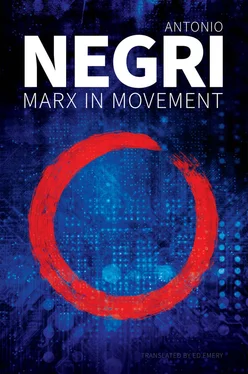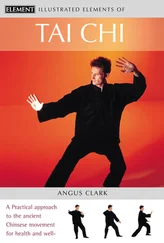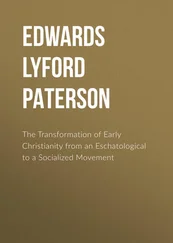In fact capital’s science of domination was far ahead of us. At the time when we were introducing the concept of the mass worker and, by implication, a critique of the category of labour power in favour of a concept of dynamism of the working class, capital, for its part, had already made tremendous advances in its own practice, as regards its theory of domination and redressing the balance of power. (Note that within the specificities and the isolation of a few national situations – in Italy in particular – we were successful in developing a remarkable level of subjective action and in bringing about moments of deep capitalist crisis.) For, while from the working-class viewpoint the revolutionary practice of the mass worker was being advanced within individual factories and within the overall interlocked system of factories and companies, capital was already responding, generally at the global and social level, with domination and control. Keynesianism, at its roots, had already demonstrated this: an awareness not only that the wage relation extended between subjects that were different (capital and the working class), but above all that the solution (favourable to capitalist development) was to be sought across the entire span of production and circulation – in other words, involving the entire sociality of the relations of production and reproduction. In the Keynesian system, state budgeting was the means of recuperating and neutralizing the class struggle in the factory, and monetary policy was the means of subordinating the wage relation. Fordism, for its part, had already transformed the high level of cooperation on the assembly line (and thus corrected those elements of weakness that labour struggles, at that level of production, were able to turn against capitalist command) into a conscious policy, one might say, of the sociality of the assembly line – a policy of command over the relation between industrial production and the reproduction of labour power, a capitalist intervention within the social flexibility of labour power, a way of privileging social command and divisions within society as conditions for command and division on the assembly line. Fordism recuperated social motivations and made them functional to the Taylorist organization of work – it posed them as the prime and fundamental terrain of command in the factory. Gradually the labour market and the fabric of relations between production and reproduction was becoming an operative field (this also from the theoretical point of view) for the capitalist theory of factory command: hence the development from Keynes’s to Kaldor’s planning techniques to Kalecki’s microanalyses of the political cycle and to the present systemic theories of neo-functionalism.
Faced with these developments in capital’s understanding of the articulations of command, not only was the concept of the mass worker late in developing, but also, crucially, it now proved incapable of developing for itself a theory able to match the new dimensions of command. Of course, the old workerists of the 1960s knew that they had to go beyond the ‘empirical’ category of the factory and that the mass worker had to become effective over the entire span of the social factory – but the factoryist content of the concept and the circumstances of its genesis prevented its theoretical potential from becoming practical reality. Thus, in the end, this impotence of the mass worker left the way open for surreptitious operations of mediation and representation – and the whole old machinery of the party form was wheeled out as the means whereby issues could be posed at the social, political and general level. We should also add (and this is not only of historical relevance) that this was the basis on which the trade union was able to re-establish its powers of control over the working class. This had a paradoxical consequence: the trade union accepted the delegation of power and the general functions that the working class had restored to it, and then went on to impose rules that separated, in a corporatist sense, the working class from the other proletarianized strata of society. When the trade union (in its traditional function, as half party and half merchandiser, in the sense that it represents labour power within the bourgeois political market and also sells labour as a commodity on the capitalist market) finally caught up with and grasped – after ’68 – the new composition of the mass worker, it only reduced it to corporatism and divided it from the rest of social labour.
Hence it follows that a methodology such as I use, which seeks to indicate possibilities for subjective genesis within the categories of class struggle, cannot rest content with this old version of the concept of the mass worker. And indeed, the conditions for further theoretical progress on this front were plentiful, especially in the years immediately following the upheavals of 1968–9. Working-class struggles, which were extremely powerful in spite of (or perhaps because of) their ambiguity as struggles both within and against the system of the relative wage, now brought about a crisis in the mechanisms of capitalist control. The capitalist response during this period developed along two complementary lines – the social diffusion and decentralization of production; and the political isolation of the mass worker in the factory.
The only possible answer to this, from the working-class viewpoint, was to insist on and fight for the broadest definition of class unity, to modify and extend the concept of working-class productive labour, and to eliminate the theoretical isolation of the concept of mass worker (insofar as this concept had inevitably become tied to an empirical notion of the factory – a simplified factoryism – owing to the impact of the bosses’ counteroffensive, the corporatism of the unions, and the historical and theoretical limitations of the concept itself). On the other hand, the emergence and growth of diffused forms of production (the ‘diffuse factory’), while they enlarged the labour market enormously, also redefined, as directly productive and ‘working class’, a whole series of functions within social labour that would otherwise be seen as marginal or latent. Finally, there was a growing awareness of the interconnection between productive labour and the labour of reproduction, and it was expressed in a wide range of behaviours in social struggles, above all in the mass movements of women and youth, who affirmed all these activities, collectively, as labour. This development made necessary an innovation in the vocabulary of class concepts: as we used to put it, ‘from the mass worker to the social worker’. But it would be more correct to say ‘from the working class’, that is, from that working class massified in direct production in the factory, ‘to social labour power’, which represented the potentiality of a new working class, now extended throughout the entire span of production and reproduction – a conception more adequate to the wider and more searching dimensions of capitalist control over society and social labour as a whole.
There are numerous problems that arise at this point, and I have no intention of trying to avoid them. In what follows I hope to confront at least some of them. It will suffice at this stage to introduce what I consider to be the key methodological concept – that of class composition – which will help to clarify much of my further argument. By class composition I mean that combination of political and material characteristics, both historical and physical, that makes up (a) the historically given structure of labour power, in all its manifestations, as produced by a given level of productive forces and relations; and (b) the working class as a determinate level of solidification of needs and desires, as a dynamic subject, an antagonistic force tending towards its own independent identity, in historical–political terms. All concepts that define the working class must be framed in terms of this historical transformability of the composition of the class. This is to be understood in the general sense of its ever wider and more refined productive capacity, the ever greater abstraction and socialization of its nature, and the ever greater intensity and weight of the political challenge it presents to capital – in other words, the remaking of the working class ! It is by reference to this framework and these criteria, for example, that we can qualify more precisely a term such as ‘spontaneity’. The concept of composition allows us to introduce a specific, determinate quality into our theoretical definition of spontaneity; it prevents us, in other words, from falling into the trap of ideological definitions (whether political, in which case spontaneity is conceived of as an indifferent category, or economistic, in which case spontaneity is reduced to the semantic emptiness of the concept of labour power, plain and simple). The category of ‘mass worker’ must accordingly be reassessed, in its functions and limitations, within this temporal framework of the transformations of the composition of the working class. And, under today’s conditions, it seems to me that this transformation is taking place through a process of real subsumption of labour by capital, a process that has now reached a level that encompasses the whole of society. Hic Rhodus, hic salta [Here is Rhodes, jump here!]
Читать дальше












